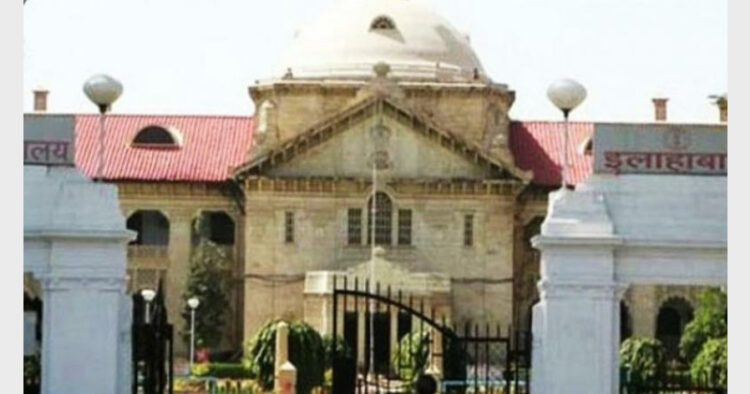On February 27, the Allahabad High Court gave six weeks’ time to the Government of India to file a counter affidavit in a Public Interest Litigation (PIL) challenging the Muslim Personal (Shariat) Application Act of 1937 and that Section 494 (Bigamy) of the Indian Penal Code (IPC). Furthermore, the bench comprising Justices Devendra Kumar Upadhyay and Subhash Vidyarthi issued notices to the Attorney General of India.
The Court is hearing a PIL filed by the Hindu Personal Law Board which challenges the Muslim Personal (Shariat) Application Act of 1937 and section 494 IPC for discrimination on grounds of religion, and therefore, being violative of fundamental rights guaranteed under Article 15. The PIL claims that Hindus, Buddhists, Jains and Sikhs practised polygamy in ancient India which is not prohibited by law. However, Muslims are permitted to practice polygamy due to the application of the Shariat Act and are excluded from punishment u/s 494 IPC which is discriminatory.
The PIL states that “in the ancient era, polygamy was permissible not only amongst the Muslims but even amongst the Hindus. It was permissible because due to frequent war, the male population was used to die in mass and so to perform the polygamy was the requirement of the day for feeding and maintaining the ladies and their children but the situation of frequent war killing male in mass is over now and so the personal law should also be changed,” Live Law reported.
The PIL added that “Hindus has been restrained by law to practice polygamy but the Muslims have not been restrained so far. This is discrimination only on the ground of ‘Religion’ and so violative of article 15 which restricts the state from discriminating amongst its citizens ‘only on the ground of religion’ and so either the Government should repeal the provision in section 5(1) and 11 of Hindu Marriage Act or to legislate a law declaring the polygamy by the Muslims also as void or to legislate the law banning the polygamy culture amongst the Muslims,” Live Law reported.
The PIL states that Article 44 of the Constitution of India mandates the legislature to enact a uniform civil code for all citizens, however, the Government of India did not interfere with personal laws for Muslims. The PIL cited legislations enacted to govern the personal law of Hindus and said that “Hindus lost their personal laws in 1955, when Hindu Marriage Act 1955, Hindu Succession Act 1955, Hindu Guardianships and Ward’s Act 1955 and Hindu Adoption and Maintenance Act 1955 were enacted by the government in spite of strong opposition of Hindus.”
Furthermore, the PIL claimed that “the activities of love Jihad are at its full swing as even married Muslims can marry and bring the girl from Hindu or Christian community to his home without divorcing his existing wife or wives. This is the situation because the law made on the subject is discriminatory only on the ground of religion.”
The PIL alleged that the rise of rapes is connected to polygamy claiming that rich Muslims marry several women while poor Muslims do not get a wife, prompting them to involve in criminal activities, Live Law reported.
The PIL added that the polygamy culture is violative of women’s fundamental rights as it discriminates on the ground of ‘sex’ urging that the government must ban it with legislation. Furthermore, the PIL stated that the divorce provisions for Muslims are not codified, whereas the divorce provisions for Hindus are codified, therefore, Muslims can divorce their wife without a valid ground or a decree of divorce from a competent civil court which is discriminatory on the grounds of religion and thus violative of Article 15.
The PIL makes the following prayers:
- “The provision in section 5(1) and section 11 of the Hindu Marriage Act 1955 and 494 IPC 1860 are against the fundamental rights guaranteed by article 14 and 15 of the Constitution and so the Government of India be directed either to repeal the provisions in section 5 (1) and section 11of Hindu Marriage Act or to make a similar provision applicable on Muslims means that either every Citizen belonging to any religion should be permitted to perform polygamy or none should be allowed to do so within the boundaries of Republic of Bharat.
- Either the bigamy by any citizen in the territory of the Bharat be made a punishable offence means either the provision in section 494 IPC is applied on all citizens belonging to any religion or it should apply on none means that the provision in article 15 which mandates the state from discriminating amongst its citizens ‘only on the ground of religion ‘be respected and applied on all citizens without any discrimination in any manner.
- Section 2 of Muslim Personal Law (Shariat) Application Act 1937 be declared as Ultravires/void to the provisions contained in article 13 and 15 of the Constitution of India and direct the respondents and it’s instrumentalities not to give effect to the provisions of above mentioned Act.
- Direct the respondents to either to apply the provision contained in section 494 I.P.C. on all the citizens of the nation without discrimination of their religion or to repeal the same,” Live Law reported.




















Comments